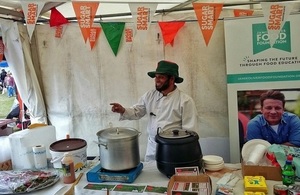Brighton and Hove city council
Brighton and Hove city council and the local community aim to reduce sugar consumption in the city.

Mohammed at the Sugar Smart cookery demonstration
Brighton and Hove city council has a goal to become a ‘sugar smart city’. The council has started a conversation with the local community about sugar consumption. Last autumn it launched a survey for local residents and one for businesses, followed by a youth debate with a panel of experts including head teachers, health professionals, business owners and a number of focus groups. The local community was encouraged to take part using the hashtag #SugarSmartCity.
More than 1,100 people responded to the survey and another 120 business took part in their poll. 8 in 10 people said they were concerned about the amount of sugar in food and drink and 7 in 10 said they wanted to reduce sugar consumption.
There was widespread support among the public for food outlets making healthier food more available and attractive and schools, leisure and shopping centres making high sugar products less available. A series of steps have been identified including introducing a voluntary levy on sugary drinks, getting cafes, restaurants and takeaways to sign up to healthy commitments, promoting water intake, using better ingredients and offering healthy deals. Over 70 food businesses have expressed an interest from big chains to small independent outlets with 30 making firm commitments.
Progress has been made with schools including:
- ‘Sugar smart’ assemblies being held at 30 schools, which have led to pupils agreeing to swap sugary drinks for healthier alternatives.
- The Kitchen Garden Project, which the council is running in partnership with the Jamie Oliver Foundation, to provide lesson-based support to schools on cooking and growing food. Nineteen schools have so far signed up.
- A sugar detectives film produced by pupils at one school – and shown in others – where children are seen exploring the school kitchen and discovering how much sugar lurks in popular foods.
- Eatwell workshops for parents to tackle fussy eating, cooking on a budget and healthy lunchboxes.
- A Healthy Choice Awards for breakfast clubs in the city – half are so far taking part.
- A Healthy Snacks for Healthy Teeth project, which has involved competitions, parent information stalls and healthy snack events at a number of schools.
This academic year, the programme is focusing on cookery and supporting families. There are Sugar Smart assemblies and the oral health promotion team and the school nurses run workshops. The community cookery worker is supporting 9 targeted schools and running Sugar Smart cookery demonstrations with recipe bags for families and staff.